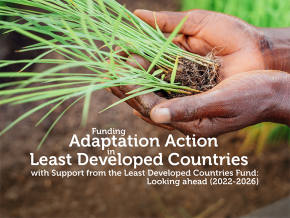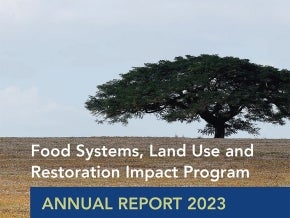The Africa Minigrids Program, a multi-partner initiative funded by the GEF and led by the United Nations Development Programme (UNDP), will enable scaled-up private investment in renewable energy minigrids
Launched at the United Nations Climate Conference COP27, the Africa Minigrids Program (AMP) is a country-led technical assistance program that supports countries to rapidly and cost-effectively provide electricity and new development opportunities to some of Africa’s poorest communities.
With funding led by the Global Environment Facility, and implemented by UNDP in partnership with national governments, RMI (founded as Rocky Mountain Institute), and the African Development Bank (AfDB), the AMP’s market transformation approach aims to help countries crowd in private investment to scale up and accelerate the deployment of renewable energy minigrids.
Minigrids are stand-alone electricity networks that are typically not connected to the national electricity grid. Solar-battery minigrids hold great potential to boost electricity access in the AMP’s 21 countries – powering households, key social services such as health centers and schools, and businesses, driving economic growth. UNDP modelling estimates that minigrids will be the lowest-cost approach to bring electricity to 265 million people in these countries by the year 2030. $65 billion in new investments, primarily from the private sector, would be needed to realize the minigrid opportunity in such countries. This is estimated to equate to the construction of 110,000 minigrids, bringing electricity to more than 200,000 schools and clinics, and more than 900,000 businesses.
“We know that innovative policies, technologies, and business models to scale up existing solutions are needed to achieve SDG 7 on universal access to affordable and reliable energy – business-as-usual won’t do,” said Achim Steiner, UNDP Administrator. “The AMP is UNDP’s most ambitious electricity access program to date. Its market transformation approach aims to deliver impact at the pace and scale needed to effectively help countries achieve the Sustainable Development Goals, leaving no-one behind.”
“Improving access to clean energy in remote areas has so many benefits — it directly improves quality of life, creates job opportunities particularly for women, and also reduces carbon emissions,” added Carlos Manuel Rodriguez, CEO and Chairperson of the GEF. “This is why the GEF is investing in energy access as part of our mission to invest in the planet. I am thrilled to see the Africa Minigrids Program advance and look forward to sharing the lessons from its rollout across our partnership and in all the countries and communities we are supporting in the clean energy transition.”
With a focus on various cost-reduction levers, AMP aims to support scale-up investment by improving the financial viability of minigrids. The program will work with countries to put in place the policies and regulations that enable large-scale private investment, durably creating the conditions for renewable energy minigrids to be deployed at scale.
Scaling up action to bring new sustainable development opportunities across Africa
Access to energy is a precondition to socio-economic development. Yet half of the people living sub-Saharan Africa – 568 million people – don’t have access to electricity, effectively locking some of the world’s most vulnerable communities in poverty. The AMP aims to bring the development benefits of energy access to a wide array of communities across the continent by focusing on supporting productive uses of energy, which supports socio-economic development by enhancing the quality of sectors that require energy input such as agriculture, healthcare, education, and small businesses.
"We cannot achieve the Sustainable Development Goals without sustainable energy for all. It is urgent to drastically scale up solutions that close the energy access gap. We must address this blatant inequality,” said Ahunna Eziakonwa, UN Assistant Secretary-General and Regional Director for Africa at UNDP. “The AMP has the potential to be a game changer for millions of people in Africa.”
"Green minigrids are not only key to closing Africa’s energy access gap, they can also provide a critical impetus to socio-economic development in rural areas, boost climate resilience and displace carbon-intensive fuel sources,” added Dr Daniel Schroth, Director, Department of Renewable Energy and Energy Efficiency, African Development Bank. “We are therefore delighted to join the AMP partnership led by UNDP to deliver the much-needed upstream work on minigrids, and look forward to bringing the catalytic finance instruments of the African Development Bank and Sustainable Energy Fund for Africa to make these projects happen on the ground.”
Building on a rich community of minigrid stakeholders together with our partners
The AMP aims to complement activities supporting minigrid investment in Africa, and has therefore identified three key areas of opportunities to focus on: national dialogues to identify the best ways to deploy minigrids; productive use of energy; and digitalization for minigrids.
The 21 AMP countries represent a diverse set of African countries, each with their own energy market specificities and development contexts: large and smaller markets; Anglophone, Francophone, and Lusophone countries; Small Island Developing States; and countries in post-crisis contexts.
“The AMP aims to harness the diversity and richness of Africa’s minigrids landscape”, said Jon Creyts, CEO of RMI. “With RMI’s Energy Transition Academy, and our Africa team’s long-standing expertise in productive uses of energy, we will create a powerful network that will replicate our think-do-scale approach on minigrids in areas lacking adequate energy access around the world.”
The AMP is a key component of UNDP’s pledge to mobilize partners through its Sustainable Energy Hub to enable 500 million additional people to have access to sustainable, affordable, reliable energy by 2025. AMP’s implementation has already started with the launch of the Nigeria and Eswatini national projects in 2022 and will continue until 2027.
The participating 21 AMP countries are: Angola, Benin, Burkina Faso, Burundi, Chad, Comoros, Democratic Republic of the Congo, Djibouti, Ethiopia, Eswatini, Liberia, Madagascar, Malawi, Mali, Mauritania, Niger, Nigeria, Sao Tome e Principe, Somalia, Sudan, Zambia.
About the UNDP Sustainable Energy Hub
The UNDP Sustainable Energy Hub is a network of partners that work alongside countries to transform energy systems though an integrated agenda focused on the policy, technology and financial shifts that shape sustainable economic development. We help countries build net-zero, people-centered societies driven by a just, sustainable energy transition. Our core principle is to support energy for development, including by mobilizing partners to enable 500 million additional people to have access to sustainable, reliable, affordable energy by 2025, leaving no-one behind. For more information: www.undp.org/energy.
About RMI
RMI is an independent nonprofit founded in 1982 that transforms global energy systems through market-driven solutions to align with a 1.5°C future and to secure a clean, prosperous, zero-carbon future for all. We work in the world’s most critical geographies and engage businesses, policymakers, communities, and NGOs to identify and scale energy system interventions that will cut greenhouse gas emissions by at least 50 percent by 2030. RMI has offices in: Basalt and Boulder, Colo.; New York City; Oakland, Calif.; Washington, D.C.; and Beijing.
About the African Development Bank
The African Development Bank Group is Africa’s premier development finance institution. It comprises three distinct entities: the African Development Bank (AfDB), the African Development Fund (ADF) and the Nigeria Trust Fund (NTF). On the ground in 41 African countries with an external office in Japan, the Bank contributes to the economic development and the social progress of its 54 regional member states. For more information: www.afdb.org.
Alexandre Pinheiro Rego
Senior Communications Officer
arego@thegef.org
GEF Secretariat
1899 Pennsylvania Ave, NW
Washington, DC 20006 USA
communications@thegef.org


